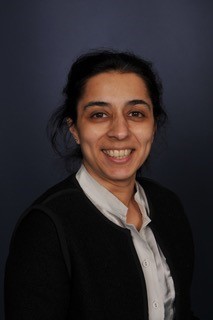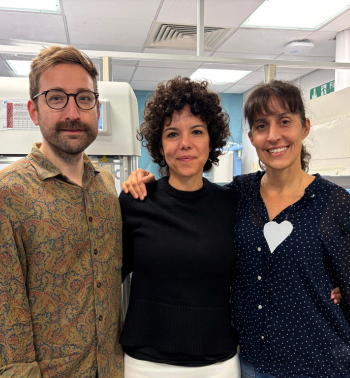13 November 2025
Dr Luke Blagdon Snell, Dr Adela Alcolea-Medina, and Dr Gaia Nebbia, through a joint effort with Prof Sejal Saglani and the Paediatric Respiratory Team at the Royal Brompton Hospital, explain how pilot funding from the King’s Health Partners (KHP) Centre for Translational Medicine has enabled them to extend and corroborate their findings in respiratory metagenomic sequencing.
Please describe your research specialism
Our research focuses on pathogen genome and metagenome sequencing for the diagnosis and management of infectious diseases. We lead translational research projects developing rapid nanopore sequencing workflows for real-time detection and characterisation of bacterial, viral, and fungal pathogens directly from clinical samples.
This includes studies on viral evolution, resistance, and vaccine failure (notably for influenza and SARS-CoV-2) and the implementation of respiratory pan-microbial metagenomics for patients with severe airway infections.
Our overarching goal is to integrate pathogen genomic and transcriptomic data into diagnostic laboratories to improve precision medicine in infection, supporting tailored therapy and improved antimicrobial stewardship.
How has pilot funding from the KHP Centre for Translational Medicine helped your research?
The funding has enabled the extension of respiratory metagenomic sequencing to a new group of patients presenting electively rather than acutely in intensive care. This work corroborated and strengthened our previous findings from the ICU cohort, confirming the diagnostic and clinical utility of metagenomics in a broader clinical setting.
In addition to pathogen detection, the metagenomic workflow also provided microbiome profiles, allowing us to explore associations between specific airway microbial communities and patient phenotypes generating new hypotheses for further translational research.
Finally, KHP support has facilitated the development of transcriptomic approaches that can be integrated with pathogen sequencing, with the ultimate goal of delivering personalised infection therapy through a combined host pathogen diagnostic framework.
How does your research have the potential to impact patients?
The real-time application of unified pan-microbial metagenomic sequencing has the potential to transform the management of infections by enabling a more personalised and targeted choice of antimicrobial therapy.
Currently, comprehensive identification of bacteria and fungi take days using traditional agar culture. By rapidly providing comprehensive pathogen detection with metagenomics within hours this approach supports rapid and informed clinical decision-making, reducing both diagnostic uncertainty and unnecessary antimicrobial exposure. Additionally, the test can detect all types of bacteria, fungi, and viruses – even those that do not grow on agar culture or are not targeted by diagnostic PCR assays.
In parallel, the ability to characterise the airway microbiome has revealed associations between specific microbial profiles and distinct patient phenotypes, generating new research questions into how microbial communities influence disease progression and treatment response.
Ultimately, integrating host transcriptomic data with metagenomic results aims to deliver a truly personalised diagnostic platform, improving patient outcomes through precise, biology-informed infection management while contributing to broader antimicrobial stewardship efforts. By identifying aberrant immune pathways in severe infections we may be able to trial personalised, pathway specific immunomodulation.
How does working within KHP benefit your research?

In particular, the partnership with the Royal Brompton Hospital paediatric respiratory team (Prof Sejal Saglani) has been instrumental. Their expertise and access to a unique patient population with complex airway diseases have allowed us to apply and validate metagenomic approaches in children, extending the translational impact of our work beyond adult intensive care settings.
KHP brings together clinicians, scientists, and diagnostic specialists from diverse fields, creating the integrated teams necessary to deliver innovative, patient-focused research. The benefit of this collaborative structure is evident: it accelerates the movement of discoveries from laboratory to clinic and fosters new avenues of investigation.
Building on this foundation, further collaborative projects are now underway to expand metagenomic and transcriptomic applications across additional patient groups and clinical contexts, continuing the translational trajectory initiated under the KHP-supported programme.
___
Dr Gaia Nebbia is a Consultant in Virology and Infectious Diseases, Guy’s and St Thomas’ NHS FT, and Honorary Reader, King’s College London.
Dr Luke Blagdon Snell is an NIHR Clinical Lecturer in Infectious Diseases, King’s College London.
Dr Adela Alcolea-Medina is a Consultant Clinical Scientist, Synnovis (Guy’s and St Thomas’ NHS FT)
___
The KHP Centre for Translational Medicine is currently accepting funding applications for its pre-doctoral (deadline: Tuesday 25 November) and postdoctoral (deadline: Thursday 18 December) Clinical Research Excellence Fellowships. The pre-doctoral fellowship offers the equivalent of one year of 100% FTE salary funding to allow protected research time, while the postdoctoral fellowship offers up to 24 months.





